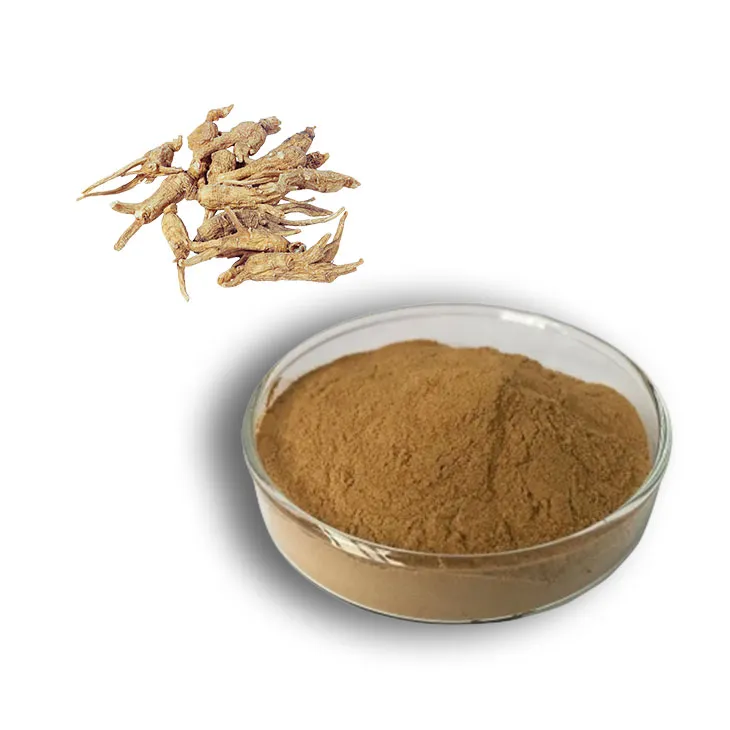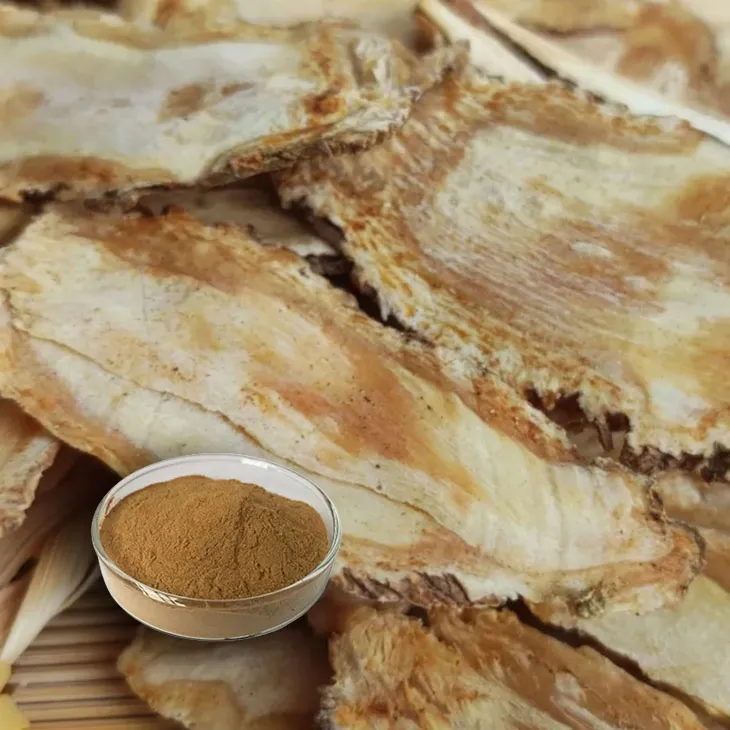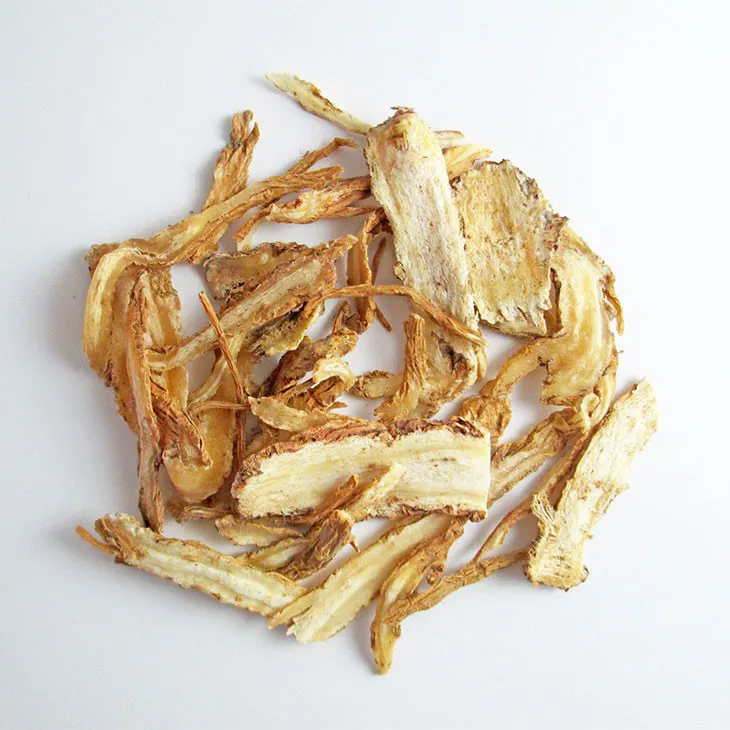- 0086-571-85302990
- sales@greenskybio.com
5 amazing things made from Angelica sinensis extract.
2024-11-13

1. Introduction to Angelica sinensis extract
Angelica sinensis, also known as Dong Quai in traditional Chinese medicine, has been used for centuries for its various health - promoting properties. The extract of Angelica sinensis is rich in bioactive compounds such as ferulic acid, ligustilide, and polysaccharides. These compounds are responsible for the numerous potential benefits that Angelica sinensis extract can offer.

2. Skincare Products
2.1 Anti - Aging Creams
Angelica sinensis extract is a popular ingredient in anti - aging creams. The antioxidants present in the extract, like ferulic acid, help to combat free radicals. Free radicals are unstable molecules that can damage the skin cells, leading to premature aging signs such as wrinkles and fine lines. By neutralizing these free radicals, Angelica sinensis extract can help to keep the skin looking youthful and radiant. Moreover, it can also improve the skin's elasticity. The polysaccharides in the extract can hydrate the skin, making it more supple and reducing the appearance of dryness, which is often associated with aging skin.
2.2 Skin Brightening Serums
For those seeking a more even skin tone, Angelica sinensis extract - based skin brightening serums can be a great option. The extract has the ability to inhibit the production of melanin, the pigment responsible for skin color. By reducing melanin production, it can help to fade dark spots, hyperpigmentation, and acne scars. This results in a more uniform and brighter complexion. Additionally, the anti - inflammatory properties of the extract can soothe irritated skin, which is beneficial for those with sensitive skin or skin conditions such as eczema or rosacea.

3. Dietary Supplements
3.1 Women's Health Supplements
Angelica sinensis has long been associated with women's health in traditional medicine. In the form of extract - based dietary supplements, it can be used to regulate the menstrual cycle. The phytoestrogens present in the extract can mimic the action of estrogen in the body to a certain extent. This can be helpful for women experiencing irregular periods or premenstrual syndrome (PMS). It may also relieve menstrual cramps by relaxing the uterine muscles. Furthermore, some studies suggest that it could potentially support hormonal balance during menopause, reducing symptoms such as hot flashes and mood swings.
3.2 Immune - Boosting Supplements
The polysaccharides in Angelica sinensis extract have immunomodulatory effects. They can enhance the function of the immune system by stimulating the production of immune cells such as macrophages and lymphocytes. This makes it a valuable ingredient in immune - boosting dietary supplements. Regular consumption of such supplements may help the body to better defend against infections, including common colds, flu, and other pathogens. In addition, the antioxidant properties of the extract can also protect the immune cells from oxidative damage, ensuring their proper functioning.

4. Haircare Products
4.1 Hair Growth Serums
Angelica sinensis extract has shown potential in promoting hair growth. The nutrients and bioactive compounds in the extract can nourish the hair follicles. Ligustilide, in particular, has been found to have a positive impact on hair follicle cells. It can stimulate the growth phase of the hair cycle, known as the anagen phase, and prolong it. This can result in longer and thicker hair over time. Additionally, the extract can improve the blood circulation in the scalp. Better blood circulation means that more nutrients and oxygen can reach the hair follicles, which is essential for healthy hair growth.
4.2 Anti - Dandruff Shampoos
In anti - dandruff shampoos, Angelica sinensis extract can play a significant role. Its anti - inflammatory properties can soothe an itchy and irritated scalp, which is often a symptom of dandruff. The extract can also help to regulate the sebum production on the scalp. Excessive sebum can contribute to the growth of Malassezia, a yeast - like fungus that is associated with dandruff. By maintaining a proper sebum level, Angelica sinensis extract can help to prevent the recurrence of dandruff and keep the scalp healthy.
5. Traditional Chinese Medicine Preparations
5.1 Herbal Teas
Herbal teas made with Angelica sinensis extract are a common form of traditional Chinese medicine. These teas are often used for their warming and blood - nourishing properties. They can be beneficial for people with cold hands and feet, which is sometimes associated with poor blood circulation. Drinking the tea can help to improve the overall blood flow in the body. In addition, it may also have a calming effect on the nervous system, helping to relieve stress and anxiety. However, it should be noted that the preparation and consumption of these herbal teas should be done under the guidance of a trained TCM practitioner, as improper use may lead to unwanted side effects.
5.2 Tinctures
Angelica sinensis tinctures are another form of traditional preparation. Tinctures are made by extracting the active compounds of the herb in alcohol or a mixture of alcohol and water. These tinctures can be used for a variety of health purposes, similar to the other forms of Angelica sinensis products. They are often more concentrated than herbal teas, so a smaller dose is usually required. However, due to their high alcohol content, they should be used with caution, especially for those with alcohol sensitivities or liver problems.
6. Conclusion
In conclusion, Angelica sinensis extract is a versatile and valuable ingredient with a wide range of applications. From skincare products to dietary supplements, haircare products, and traditional Chinese medicine preparations, it offers numerous potential benefits. However, it is important to note that while the extract has shown promise in various areas, more research is still needed to fully understand its mechanisms of action and potential side effects. Additionally, when using products containing Angelica sinensis extract, it is advisable to choose high - quality products from reliable sources and, in the case of traditional Chinese medicine preparations, consult a professional for proper guidance.
FAQ:
Question 1: What are the main health benefits of products made from Angelica sinensis extract?
Products made from Angelica sinensis extract are often associated with several potential health benefits. It may have anti - inflammatory properties, which can help in reducing inflammation in the body. It is also believed to have a positive impact on women's health, such as relieving menstrual discomfort. Additionally, it may contribute to better blood circulation as it has been traditionally used to nourish the blood in some medical systems.
Question 2: Are there any skin - care products made from Angelica sinensis extract? What are their effects?
Yes, there are skin - care products made from Angelica sinensis extract. In skin - care, it can help moisturize the skin due to its hydrating properties. It may also have antioxidant effects, which can protect the skin from damage caused by free radicals. This can potentially slow down the aging process of the skin, such as reducing the appearance of wrinkles and improving skin elasticity.
Question 3: How is Angelica sinensis extract used in traditional medicine?
In traditional medicine, Angelica sinensis extract is often used in various forms. It can be made into decoctions, where the dried root is boiled in water and the resulting liquid is consumed. It is used to treat conditions like anemia as it is thought to enrich the blood. It is also used for some gynecological disorders, such as irregular menstruation. Sometimes, it is combined with other herbs to enhance its medicinal effects.
Question 4: Can products made from Angelica sinensis extract be used by everyone?
No, products made from Angelica sinensis extract may not be suitable for everyone. For example, pregnant women should be cautious as some of its effects on pregnancy are not fully understood and it may potentially cause uterine contractions. People with certain medical conditions, such as bleeding disorders, may also need to avoid it as it may affect blood clotting. It is always advisable to consult a healthcare professional before using any products containing this extract.
Question 5: What is the production process of products made from Angelica sinensis extract?
The production process can vary depending on the type of product. For extracts used in medicine or supplements, the roots of Angelica sinensis are first harvested. They are then cleaned and dried. The dried roots are usually ground into a powder. To obtain the extract, the powder may be soaked in a solvent, such as alcohol or water, for a period of time. This liquid is then filtered and concentrated to get the final extract. For skin - care products, the extract may be further processed and combined with other ingredients like oils, emulsifiers, and preservatives to create creams, lotions, etc.
Related literature
- Title: The Medicinal Properties of Angelica sinensis: A Comprehensive Review"
- Title: "Angelica sinensis in Cosmetic Applications: Current Research and Future Prospects"
- Title: "Traditional Uses and Modern Scientific Validation of Angelica sinensis"
- ▶ Hesperidin
- ▶ Citrus Bioflavonoids
- ▶ Plant Extract
- ▶ lycopene
- ▶ Diosmin
- ▶ Grape seed extract
- ▶ Sea buckthorn Juice Powder
- ▶ Fruit Juice Powder
- ▶ Hops Extract
- ▶ Artichoke Extract
- ▶ Mushroom extract
- ▶ Astaxanthin
- ▶ Green Tea Extract
- ▶ Curcumin
- ▶ Horse Chestnut Extract
- ▶ Other Product
- ▶ Boswellia Serrata Extract
- ▶ Resveratrol
- ▶ Marigold Extract
- ▶ Grape Leaf Extract
- ▶ New Product
- ▶ Aminolevulinic acid
- ▶ Cranberry Extract
- ▶ Red Yeast Rice
- ▶ Red Wine Extract
-
Genistein
2024-11-13
-
Bilberry Extract
2024-11-13
-
Curcuma Longa Extract/Turmeric extract
2024-11-13
-
Curcuma Longa Extract
2024-11-13
-
Plantain extract
2024-11-13
-
Resveratrol extract
2024-11-13
-
Peppermint Oil
2024-11-13
-
Giant Knotweed Extract
2024-11-13
-
Alisma Extract
2024-11-13
-
Purple Sweet Potato Extract
2024-11-13





















